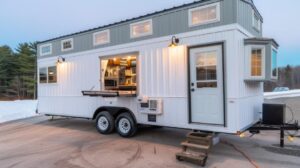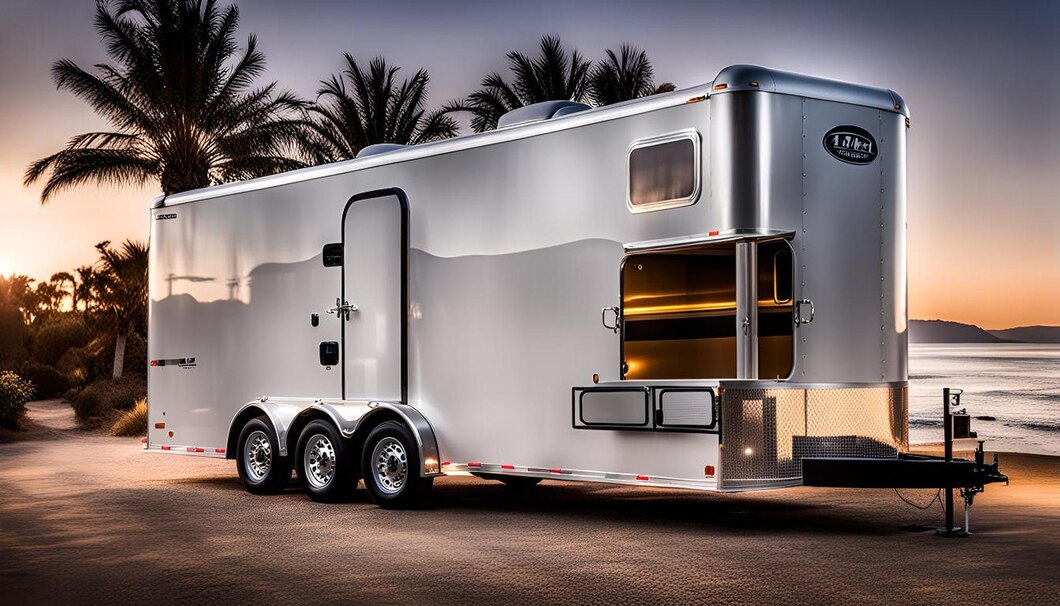Durability, safety, and utility all depend on the correct raft trailer decking. Whether you’re moving kayaks, rafts, or paddleboards, your trailer decking has to resist the elements, weight, and continual wear. Many materials will have better lifetime and robustness in 2024 thanks to advances. The best five durable choices for raft trailer decking will be discussed in this post together with some performance analysis of each choice. We will also discuss how these decking materials can help someone wishing to build or alter a small house trailer as well.

1. Lightweight, rust-resistant aluminium decking
One of the best options for raft trailer decking in 2024 still is aluminium decking. Its modest weight helps your trailer to be easier to tow and improves fuel economy by lowering its total weight. Aluminium also resists rust, which is a big benefit for trailers that will regularly come into touch with water.
This is especially important for people who are moving rafts, kayaks, or paddleboards since aluminium doesn’t corrode even under continuous water exposure. Although aluminium can be more costly initially, its long-term durability makes it a good purchase. Furthermore noteworthy is the popularity of aluminium decking among small house trailers due to its lightweight yet strong construction.
2. Pressure-treated wood is a classic and reasonably priced fix
For decades, raft trailer decking has made dependable and reasonably priced use from pressure-treated wood. This choice is still preferred in 2024 for its availability, cost-effectiveness, and durability. Particularly for trailers that might be subjected to different weather conditions, pressure-treated wood is chemically treated to withstand moisture, insects, and decay, therefore perfect for outside use.
Although wood is more weight than other materials like aluminium, its strength and rot resistance guarantee that it may manage big loads without buckling. To maintain the wood in the best shape, nevertheless, it needs constant care including staining and sealing. Notwithstanding this, many find pressure-treated wood appealing because of its natural look, which may also be a selling feature for someone building a tiny home trailer with a more rustic look.
3. Low-maintenance alternative Composite Decking
In the market for raft trailer decking, composite decking is becoming rather trendy. By combining plastic and wood fibres, this material produces a product that looks like wood but requires significantly less care. For trailers that are regularly in the weather, composite decking is a great option since it resists dampness, insects, and rot.
Composite decking offers one of the advantages: low upkeep. For those who would rather not deal with constant maintenance, it is a hassle-free choice since unlike wood it does not call for staining or sealing. Furthermore, the slip-resistant surface of composite decking is perfect for loading and emptying rafts, therefore increasing additional safety.
For small home trailers, composite decking’s robustness and elegant look also make it a good option since it guarantees a lifetime and a modern look.

4. Steel decking: maximum strength for large loads
Steel is a strong choice if you require raft trailer decking able to manage very heavy loads. For individuals who move big and heavy rafts or other boats, steel decking provides unparalleled strength and durability. Furthermore very resistant to impact and able to bear considerable over time wear and tear over time in steel decking.
The fact that steel decking corrodes easily is one possible drawback, though. Modern steel decking sometimes includes a protective coating or galvanising to fight corrosion. Although the trade-off is better durability, steel is a heavier substance therefore it could influence the hauling weight of your trailer. Particularly if durability and strength are top concerns, steel decking can also be customised for use on a small house trailer.
5. Rubberized Decking: Water Resistant and Shock Absorption
Newer on the raft trailer decking market, rubberized decking is becoming more and more popular for its special qualities. Made from recycled rubber, this substance has great water resistance and is therefore perfect for trailers that regularly come into touch with water. Excellent traction from the rubberized surface lowers the chance of slipping while loading and emptying watercraft.
Rubberized decking’s capacity to absorb shock is another major benefit; this helps while hauling delicate or inflatable rafts. Often composed of recycled materials, this substance is also ecologically benign. Although rubberized decking might not be as commonly available as other choices, its increasing appeal in 2024 is because of its durability, water resistance, and safety characteristics.
For individuals who give sustainability and safety a top priority, rubberized decking is also becoming increasingly popular among small house trailer builders for its environmentally friendly qualities and slip-resistant surface.
6. Factors Influencing Raft Trailer Decking Selection
When selecting raft trailer decking, one should take maintenance, weight, and durability into great attention. While lightweight choices like aluminium or composite decking can improve fuel economy, heavier materials like steel offer exceptional strength but could raise hauling weight. Another important factor is the degree of maintenance needed; for instance, whilst composite and rubberized decking are low-maintenance substitutes, wood needs frequent maintenance.
Apart from decking for raft trailers, these materials can be modified for other trailer purposes like small home trailers. Many small house builders give materials with durability, weather resistance, and little maintenance top priority; so, alternatives like composite, rubberized, and aluminium decking appeal.

7. Small Home Trailers’ Decking
Although this essay mostly addresses raft trailer decking, many of the materials covered would fit small house trailer constructions rather nicely. Small dwellings are generally subjected to strong weather and frequent transportation, hence it’s important to select decking materials that give both strength and weather resistance. Particularly popular for small house trailers are aluminium and composite decking since they are lightweight, strong, and require little maintenance.
Pressure-treated wood is still a great choice for small house aficionados looking for a rustic or natural look. However adequate maintenance of wood is crucial to avoid rot or deterioration, particularly in areas subjected to consistent rain and moisture. Although hefty, steel decking can also be utilised for small houses where robustness is of great importance.
Conclusion
Selecting the appropriate raft trailer decking for 2024 calls for weighing many variables like cost, weight, maintenance, and durability. For those looking for a lightweight, rust-resistant alternative, aluminium is still a top choice; pressure-treated wood provides a classic and reasonably priced answer. A low-maintenance alternative is composite decking; steel offers the best strength for large loads. Ultimately, rubberized decking is becoming more and more popular with trailer owners since it presents special water-resistant and shock-absorbing qualities.
These five choices provide something for everyone whether your project is building a little house trailer or updating the decking of your raft. To guarantee long-lasting performance and value, carefully balance the benefits and drawbacks of every material to identify the optimum fit for your requirements.
